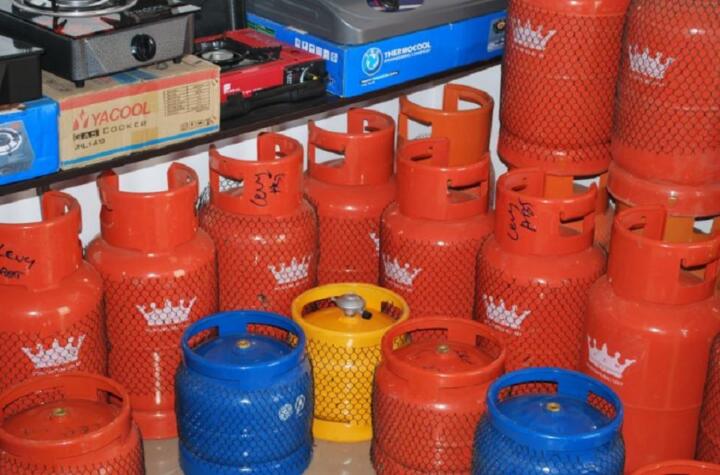Cooking gas retailers across Nigeria have sounded the alarm over a looming scarcity of Liquefied Petroleum Gas (LPG), warning that the supply disruptions and rising prices may soon leave millions of households struggling to afford or access the essential commodity. The retailers, under the aegis of the Nigerian Association of Liquefied Petroleum Gas Marketers (NALPGAM) and Cooking Gas Retailers Association of Nigeria (CGRAN), expressed concern that import delays, supply bottlenecks, and high foreign exchange costs are threatening the stability of the domestic gas market.
According to the associations, the current market situation is unsustainable and may worsen if urgent government intervention is not implemented. They said that over the past few weeks, supply from major depots has dwindled significantly, causing retail prices to climb steeply in most states. Retailers reported that the average price of a 12.5-kilogram cylinder of cooking gas, which sold for around ₦9,000 in early October, now ranges between ₦12,000 and ₦13,500, depending on location.

In Lagos, Abuja, and Port Harcourt, several gas stations have begun rationing sales, while others have shut down temporarily due to lack of stock. According to CGRAN’s National Chairman, Mr. Michael Umudu, the crisis stems from “reduced supply from local producers, increased reliance on imports, and high vessel and handling charges.” He explained that most retailers can no longer afford to purchase gas at prevailing depot prices, as the costs have risen faster than consumers’ purchasing power.
Umudu warned that the situation, if unchecked, could escalate into a nationwide shortage similar to the one experienced in late 2021. He said, “The signs are already there. Retailers are struggling to get supply, and the prices are beyond the reach of many Nigerians. If the federal government does not act fast, the scarcity will spread and affect every household that depends on LPG.”
NALPGAM’s Executive Secretary, Mr. Bassey Essien, corroborated the claims, noting that the current challenge is compounded by the volatility of the naira and the rising cost of importation. He revealed that more than 60 percent of the LPG used in Nigeria is imported, meaning fluctuations in exchange rates directly affect domestic prices. “With the naira trading above ₦1,400 to the dollar, importers are under immense pressure. This has made it difficult to maintain consistent supply at affordable prices,” he said.
Essien added that the domestic gas supply from major producers such as NLNG has been inconsistent due to maintenance schedules and export prioritisation. He lamented that despite Nigeria’s vast natural gas reserves, the country still imports a significant portion of its LPG needs. “It is ironic that a gas-rich nation like Nigeria is facing cooking gas shortages because of policy and infrastructural gaps. We need to invest in more local processing and distribution capacity to stabilise the market,” he said.
The associations urged the federal government, through the Nigerian Midstream and Downstream Petroleum Regulatory Authority (NMDPRA) and the Ministry of Petroleum Resources, to intervene immediately. They called for improved coordination with producers and marketers to ensure steady distribution and pricing transparency. They also demanded the removal of bottlenecks in LPG transportation, especially the high cost of moving gas from terminals to inland states, which they said has further inflated retail prices.
Retailers also warned that continued price hikes could push consumers back to unsafe cooking alternatives such as firewood, charcoal, and kerosene, thereby undermining national clean energy targets. They said such a development would worsen deforestation and increase household pollution, reversing years of progress made toward energy transition and environmental sustainability.
Analysts have attributed the current instability to inadequate storage facilities and the government’s slow implementation of the Decade of Gas Initiative, which was launched to make LPG the primary household fuel by 2030. They argue that until Nigeria expands its domestic gas infrastructure and reduces import dependence, price volatility and scarcity will remain recurring challenges.
Energy economist Dr. Bala Zakka stated that part of the problem lies in the inconsistent pricing mechanism. He explained that because depot operators and importers adjust prices daily based on foreign exchange rates and international oil prices, retailers face unpredictable margins. “We need a clear regulatory framework that ensures fairness along the value chain. Without stability, consumers will keep bearing the brunt,” he said.
Meanwhile, some marketers are calling for urgent government support through forex access, reduced import levies, and improved access to credit for small-scale retailers. They believe that easing financial constraints will enable them to maintain operations and serve consumers at more reasonable prices.
In response to growing public concern, the NMDPRA has reportedly begun consultations with key stakeholders in the LPG sector to address supply challenges. A senior official of the agency, who requested anonymity, said discussions are ongoing to balance domestic production, import levels, and pricing frameworks to avoid a full-blown shortage.
However, many retailers remain skeptical, insisting that immediate action is needed to avert a crisis. “We have heard many promises before, but the situation keeps getting worse,” said Umudu. “If nothing changes in the next few weeks, cooking gas could become unaffordable for the average Nigerian family.”
The associations concluded by urging President Bola Tinubu’s administration to treat the looming scarcity as a national emergency, stressing that stable and affordable access to cooking gas is vital to both economic and environmental sustainability.
Support InfoStride News' Credible Journalism: Only credible journalism can guarantee a fair, accountable and transparent society, including democracy and government. It involves a lot of efforts and money. We need your support. Click here to Donate
